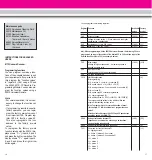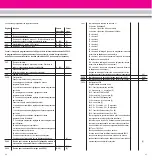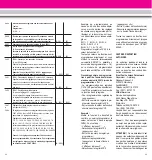
Beim Programmieren mit neueren
Universal-Handys 55015P (“parallel”
mit Programmiermodus “C”) und
MZS-PC-Decoderprogrammiermo-
dulen 55045 werden alle Werte direkt
programmiert.
Programmieren mit älteren
Universal-Handys 55015 (mit
Programmiermodus "P"):
- Register CV 1 bis CV 4 können
direkt programmiert werden, indem
der gewünschte Funktionswert in
das betreffende Register eingetra-
gen wird.
- Für höhere CVs gilt:
- In Register CV 6 die Nummer des
zu programmierenden Registers
eintragen.
- In Register CV 5 dann der
gewünschte Funktionswert
programmiert.
Programmierbeispiel:
Übernahme-Funktion einschalten
(Register CV 54 auf Funktionswert 3
programmieren).
Programmierablauf:
- Anzeige zeigt “P --”
- Register CV 6 wählen (Taste 6
drücken).
- 54 eingeben (zu programmieren-
des Register).
- Programmierablauf auslösen
(rechte Pfeiltaste drücken).
- Anzeige zeigt “P --”
- Register CV 5 wählen (Taste 5
drücken).
- 3 eingeben (zu programmierender
Funktionswert).
- Programmierablauf auslösen
(rechte Pfeiltaste drücken).
AUTORISIERTER SERVICE
Bei unsachgemäßer Wartung wird
Ihre Garantie ungültig. Um fachge-
rechte Reparaturleistungen zu erhal-
ten, wenden Sie sich an Ihren Fach-
händler oder an die LGB-Service-
Abteilung:
Ernst Paul Lehmann Patentwerk
Reparatur-Abteilung
Saganer Straße 1-5
D-90475 Nürnberg
DEUTSCHLAND
Tel.: (0911) 83707 0
Telefax: (0911) 83707 70
Die Einsendung erfolgt zu Ihren
Lasten.
Hinweis: Informationen zur LGB und
zu LGB-Vertretungen in aller Welt fin-
den Sie im Internet unter www.lgb.de
VORSICHT! Dieses Modell ist nicht
für Kinder unter 8 Jahren geeignet.
Das Modell hat kleine, scharfe und
bewegliche Teile. Am Lokgestänge
besteht Quetsch- und Klemmgefahr!
Verpackung und Bedienungsanlei-
tung aufbewahren.
Artikel, technische Daten und Liefer-
daten können sich ohne Vorankündi-
gung ändern. Einige Artikel sind
nicht überall und über alle Fachhänd-
ler erhältlich. Einige Abbildungen zei-
gen Handmuster. LGB, LGB of Ame-
rica, LEHMANN und der LGB TOY-
TRAIN-Schriftzug sind eingetragene
Marken der Firma Ernst Paul Leh-
mann Patentwerk, Nürnberg, Deuts-
chland. Andere Marken sind eben-
falls geschützt. © 2004 Ernst Paul
Lehmann Patentwerk.
22871
SNCF Mikado Steam Loco,
141R 840
THE PROTOTYPE
The 2-8-2 “Mikados” were among
the most successful steam locomo-
tives of all time. The first Mikados
were built in 1897 at the Baldwin
Locomotive Works for the narrow
gauge railways of Japan. During
World War I, the United States Rail-
road Administration adopted the
Mikado as its standard freight loco-
motive, and more than a thousand
“Mikes” were delivered to more than
a dozen American railways.
In the early 1950s, the SNCF urgent-
ly needed large numbers of locomo-
tives and ordered the 141R class
from the United States and Canada.
The locos were equally at home haul-
ing heavy freight trains or the
famous overnight express trains run-
ning from Paris to the west of
France. Today, you can enjoy these
great locomotives on museum rail-
ways in France and Switzerland.
THE MODEL
This detailed replica features:
- weather-resistant construction
- factory-installed onboard decoder
for MTS and analog operation
- opening cab roof vents
- opening firebox door
- four-way power control switch
- protected gearbox with seven-pole
Bühler motor
- articulated drive for short-radius
“R1” curve compatibility
- eight powered wheels
- two traction tires
- twelve power pickups
- voltage stabilization circuit
- smoke generator
- simulated firebox fire
- automatic directional lanterns
- one multi-purpose socket with
circuit breaker
- length: 930 mm (36.6 in)
- weight: 7400 g (16.3 lb)
OPERATION
Preparation
Couple the loco to the tender: Lift the
hook at the rear of the loco over the
loop on the front of the tender. Con-
nect the wiring cable (Fig. 1).
Attention! The cable can be damaged
by rough handling. When discon-
necting the tender, do not pull on the
cable. Pull on the plug only.
A bag with detail parts is included.
Attach these parts as shown in the
separate instructions.
Operating Modes
This model has a four-way power
control switch mounted inside the
cab (Fig. 2, 3):
Position 0: All power off
Position 1: Power to lights and
smoke generator
Position 2: Power to lights, smoke
generator and motor
Position 3: Same as Position 2
(factory pre-set)
Hint: Reaching the power control
switch is easier when the loco is
parked on a curved track.
Attention: Do not connect this model
to other loco models with different
starting characteristics. This can
damage the internal gearing.
13
12
GB
USA

































